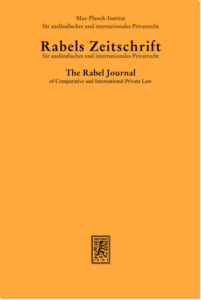New issue alert: RabelsZ 4(2021)
 The latest issue of RabelsZ has just been published online. It contains the following contributions:
The latest issue of RabelsZ has just been published online. It contains the following contributions:
Jaakko Husa: Merging International Law and Comparative Law – Balancing Between Normative and Non-Normative, Volume 85 (2021) / Issue 4, pp. 745-774 (30), https://doi.org/10.1628/rabelsz-2021-0045
The relationship between comparative law and public international law is paradoxical. These fields are in principle close to each other but remote in practice. The emergence of comparative international law has changed the situation as it invites comparative law scholars to enter into discussion on international law. This article provides a critical analysis on the possibilities for comparative law in the field of international law. It discusses and explains why a non-normative understanding of comparative international law works well together with the pluralist conception of comparative law, and why a normative understanding of comparative international law is incompatible with it. This article explains why comparative law scholars do not welcome the use of comparative law for international law purposes with open arms.
Malte Kramme: Mehr als ein Qualifikationsproblem: Zum Verhältnis von Verbrauchervertrags- und Geschäftsfähigkeitsstatut, Volume 85 (2021) / Issue 4, pp. 775-810 (36), https://doi.org/10.1628/rabelsz-2021-0046
More than a Problem of Characterization: The Relationship Between Consumer Contract Law and the Law of Capacity. – The EU regulations in the area of private international law largely exclude legal capacity. The law applicable to questions of capacity is determined by the applicable national conflict-of-law rules. This raises the question of the scope of the law of capacity and how it is to be distinguished from neighbouring fields of law. In particular, drawing this distinction vis-à-vis contract law presents difficulties in cases involving consumers. Both consumer law and the law of capacity place the protection of the weaker party in the foreground. Distinguishing the law of capacity from neighbouring fields of law is therefore more than a mere problem of characterization: it is a matter of not undermining the level of protection sought by the different fields of law in cross-border cases. In this paper, a proposal is made as to how the boundaries of the law of capacity can be determined in relation to contract law, taking into account this intended protection of the weaker party.
Jürgen Samtleben, Gonzalo A. Lorenzo Idiarte: Das Allgemeine Gesetz des Internationalen Privatrechts von Uruguay, Volume 85 (2021) / Issue 4, pp. 811-851 (41), https://doi.org/10.1628/rabelsz-2021-0047
The Uruguayan General Law of Private International Law. – Uruguay has always been a center for private international law. The Montevideo Congress, held in 1888 and 1889 at Uruguay’s invitation – before the Hague Conference on Private International Law – was of instrumental significance for the development of private international law in Latin America. Uruguay has consistently played an active role in preparing the inter-American specialized conferences on private international law and in propagating bilateral PIL treaties. The new private international law legislation underway since the end of the last century does not break with tradition completely, but seeks to develop it further adapting it to present-day demands. Some major features of the reform bear emphasis: a comprehensive regulation of the general rules of private international law, refinements to the contours of international family law, a recasting of international contracts law based on party autonomy, and detailed rules on the exercise of jurisdiction by national courts in international disputes.
For a German translation of the Uruguayan General Law of Private International Law of 27 November 2020 by Samtleben, see: Volume 85 (2021) / Issue 4, pp. 907-925 (19), https://doi.org/10.1628/rabelsz-2021-0052
Issue 4/2021 also includes the following contributions originating in the Symposium “The Code of Capital”, held at the Max Planck Institute for Comparative and International Private Law in Hamburg on 11 May 2021:
- Ralf Michaels: Vorwort zum Symposium, Volume 85 (2021) / Issue 4, pp. 852-853 (2), https://doi.org/10.1628/rabelsz-2021-0048
- Hans-Bernd Schäfer: Nationalreichtum und private Armut durch Zivilrecht? – Eine Besprechung des Buchs »The Code of Capital« von Katharina Pistor, Volume 85 (2021) / Issue 4, pp. 854-875 (22), https://doi.org/10.1628/rabelsz-2021-0049
- Katharina Pistor: Recht und Ökonomie im Spannungsfeld verschiedener Schulen – Eine Replik auf Hans-Bernd Schäfers Buchbesprechung, Rabels Zeitschrift für ausländisches und internationales Privatrecht (RabelsZ), Volume 85 (2021) / Issue 4, pp. 876-889 (14), https://doi.org/10.1628/rabelsz-2021-0050
- Ralf Michaels: Der Code des Kapitals und seiner Portabilität – Anmerkungen zu Katharina Pistor, Rabels Zeitschrift für ausländisches und internationales Privatrecht (RabelsZ), Volume 85 (2021) / Issue 4, pp. 890-906 (17), https://doi.org/10.1628/rabelsz-2021-0051